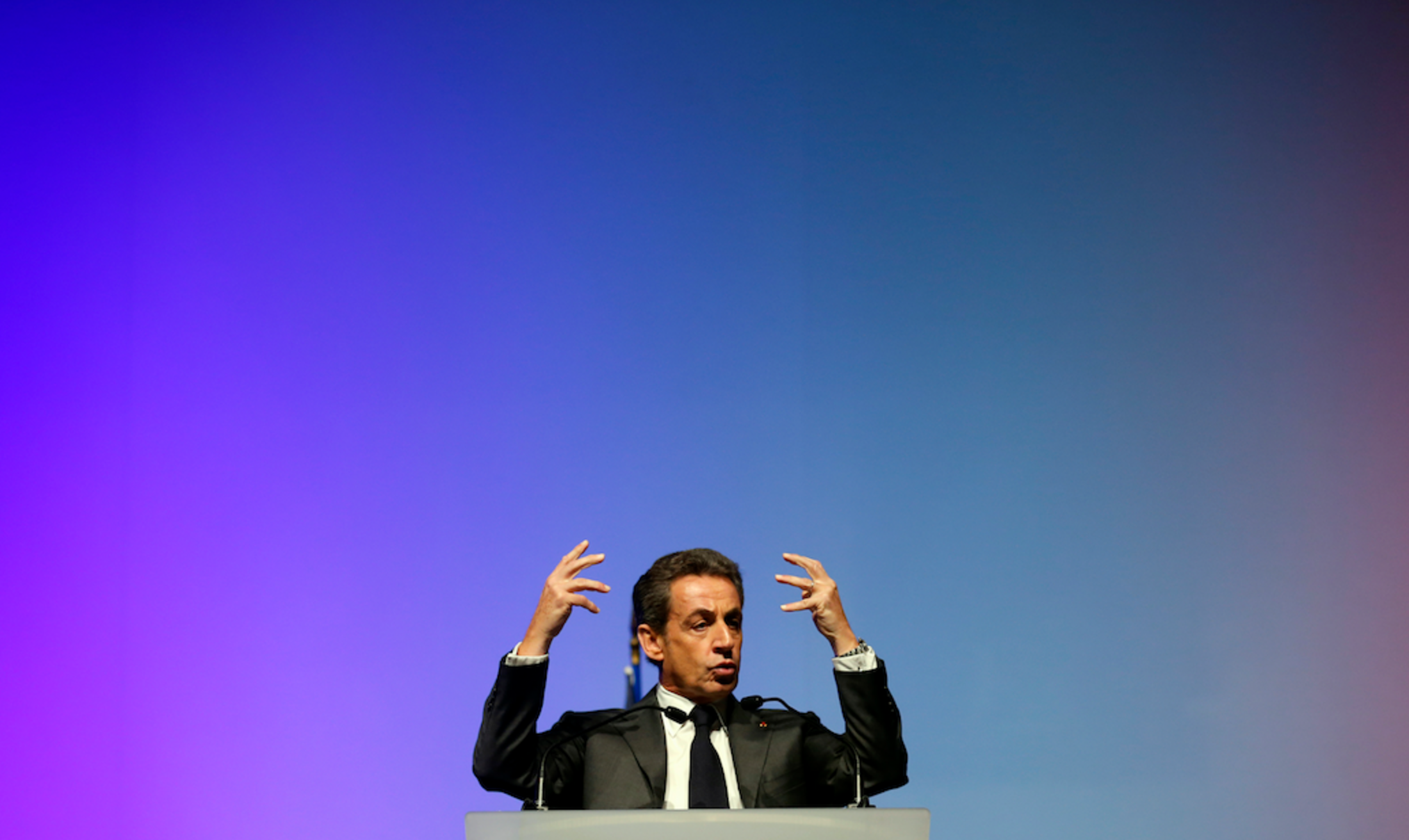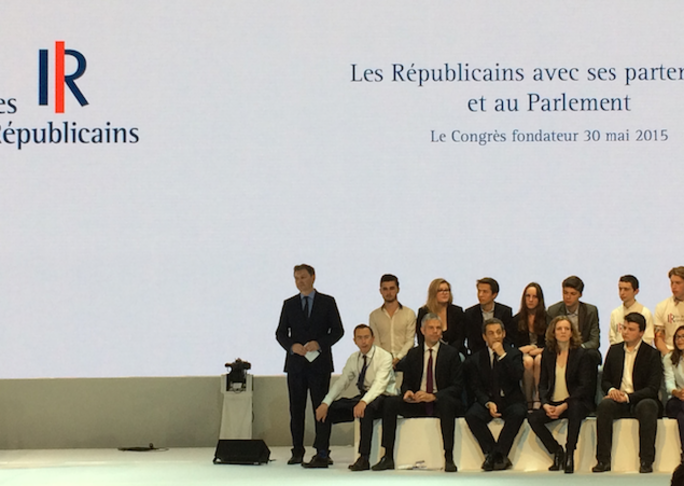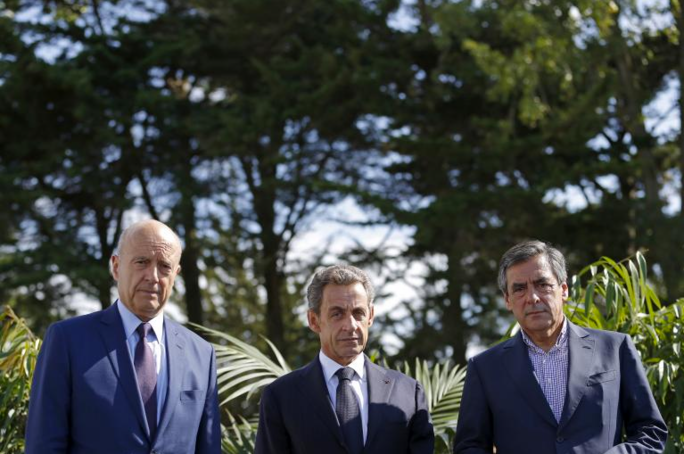For a long while, Nicolas Sarkozy believed that his return to politics, two years after losing office in 2012, and explaining that he was a changed man, was all that was needed to erase unfavourable memories of his term as president and his electoral defeat at the hands of François Hollande.
“He hasn’t been able to recreate an élan,” commented one of his former close advisors, speaking on condition that his name was withheld, as is the case of most others cited in this article. “It’s now too late. The detestation he produces is far too important for him to be able to fight it.”
It has been a hard landing for Sarkozy, and he has panicked as a result. One year after his election as head of the conservative UMP party, tainted by scandal and which he has since succeeded in renaming Les Républicains (LR), none of the objectives fixed by the former president have been met. He had wanted to swell the party’s membership to 500,000, whereas between September 2014 and September 2015 it has in fact decreased from 181,000 à 178,920.

Enlargement : Illustration 1

He had wanted to bring back into line all those among his former allies in the party who had left the fold but, as symbolised by his ex-minister Nadine Morano, more and more now in fact distance themselves from their one-time mentor.
Sarkozy saw himself as the buttress against the increasing electoral gains made by the far-right Front National (FN) party, but in reality he has appeared to be running behind the agenda set by FN leader Marine Le Pen.
Finally, he had clearly hoped that his party would serve as a shield against the various judicial investigations into corruption in which he is implicated, but he remains stuck in the scandals.
The result is an opposition party that has hardly evolved under the past 12 months of his leadership. If anything, it has weakened. “The party no longer attracts because he [Sarkozy] is the showcase and he no longer attracts,” said one LR Member of Parliament who supports conservative veteran heavyweight Alain Juppé in the race to become the party’s presidential candidate.
The party’s principal spokespeople, Lydia Guirous and Sébastien Huygue, put on a show of unity before the press. But one well-placed LR insider and Sarkozy critic described how “they hate each other and never meet up outside of the weekly press briefing”, adding: “They together sum up what the UMP has become under Sarkoy, a gathering of the double-faced.”
It appears as if Sarkozy, with an eye to the primary race next year to decide the party’s candidate for the presidential elections in 2017, is trying to find potential scapegoats for the problems surrounding him. Mediapart has learnt that during a meeting of the LR leadership on September 22nd, Sarkozy told the party’s deputy leader Nathalie Kosciusko-Morizet: “When, with Juppé, you called [on the electorate in local elections] for a vote for the socialists where there was a [Socialist Party-Front National] duel there was, from that moment on, a hole in membership applications. So you carry a heavy responsibility in that decrease.”

Enlargement : Illustration 2

Last year Sarkozy’s 2012 presidential election deputy campaign director, Jérôme Lavrilleux, was placed under investigation (one step short of being charged) over his self-confessed role in a scam by which Sarkozy’s campaign meetings were billed to his then-UMP party instead of to his campaign organization, as required by law, and which is the subject of an ongoing judicial investigation. The events company which organised his meetings, Bygmalion, invoiced the party with falsified bills to get round the strict rules on the funding of French political campaigns.
In an interview last week with French weekly news magazine L’Obs, Lavrilleux was scathing of Sarkozy. “There is only he who can say in his statement [given to investigators] that this [Bygmalion] business doesn’t concern his campaign,” he said. “It is a system of defence that is bound to fail totally. He adopts the same [tactic] in all the affairs he is questioned about – ‘it’s not me, it’s the other one’ [...] He is shirking. He lives in an unreal world, and doesn’t know how to assume [his actions]. Top leaders are however those who assume [their actions]. Ingratitude is the mark of the weak.”
Sarkozy is certainly weakened in that he is ringed by enemies. Firstly by his fellow LR party rivals, notably Alain Juppé but also Sarkozy’s former prime minister, François Fillon, who watch over him, ready to pounce, and prevent him from doing as he would like. Secondly by the investigating magistrates before whom both Sarkozy and a number of his former allies are regularly summoned for questioning in several ongoing corruption investigations.
While none of his political adversaries will attack with him on-the-record comments over the scams, Sarkozy knows only too well the potential danger to his political future that the probes represent. “I will be the king or the kingmaker” the former president is keen to repeat among his entourage. One party official told Mediapart that Sarkozy would choose his former economy minister François Baroin as his replacement if ever he was unable to stand in the primary elections. Baroin, 50, who has, according to observers, been at pains of late to present himself as a potential prime minister, showed his loyal support for Sarkozy and the belief that he will be chosen as LR candidate, in an interview earlier this month with Paris Match magazine. “I’d like to have a return match because that has never been had, because Nicolas Sarkozy deserves it, because he wasn’t playing on an even field in 2012 against François Hollande.”
In a sign of his self-doubt over the primaries, aware that his only chance of winning them is if there is a low turnout, Sarkozy told a meeting of regional LR party branch secretaries on October 12th that the 10,000 voting centres for the race should be reduced. Despite the fact that the number of urns was validated by the party’s leadership committee in April, he told the branch secretaries that the figure of 10,000 was “not realistic” and that the number should be reduced by 2,000.
“Concerned about mobilisation, Nicolas Sarkozy explained to the [regional] secretaries that it would be very difficult to have 10,000 voting centres because that means having an army of 80,000 volunteers to manage them,” said LR party director general and Sarkozy ally Frédéric Péchenard in an interview with French daily Le Monde. That appeared to be something of a climbdown over Sarkozy’s past belief in his capacity to mobilize party sympathisers.
'He spends his time saying any old thing'
Sarkozy’s principle rival in the race to become LR party candidate in the presidential elections is Alain Juppé. His campaign director, Gilles Boyer, told Mediapart that Sarkozy’s comments regarding the number of voting centres in the primaries was “of no consequence” because a decision on their numbers had been agreed in April. “Nicolas Sarkozy must tell himself that it is not he who will oversee all that, but an independent authority,” said Boyer.
A close ally of Bruno Le Maire, the former conservative agriculture minister and currently the best-placed outsider in the race, said Sarkozy “feels very well” that he has lost control of events. Contrary to the past abiance, when Sarkozy now attends public meetings of party supporters he receives no greater applause than rivals Alain Juppé and François Fillon. But one LR Member of Parliament who backs Le Maire advised caution. “You must be careful, because he always ends up exciting a public audience, even an unwilling one,” he said.
“He has an undeniable talent that can create illusions,” commented a senior party official hostile to Sarkozy, “but once one leaves a meeting and thinks two seconds about what was said, there’s nothing left.” The former president is also losing the support of what was once a loyal and vociferous group of part militants who, said the party official, “would go and jump in the [river] Seine if they were asked”, and whose numbers are fewer and fewer.

Enlargement : Illustration 3

When Sarkozy was elected as president of the now-renamed UMP party on November 29th last year, he drew 100,491 votes out of a total cast by party members of 155,801. This September, the first online consultation of party members over policy decisions, and which was dedicated to the question of immigration, attracted just 53,000 participants. “On a subject like immigration, supposed to excite our militants, it’s a little weak,” commented one of the party’s MP’s who is allied to Alain Juppé. In the second consultation, organised this month on the question of labour laws and notably the future of France’s 35-hour working week – an issue that continues to prompt passionate debate – the number of participants dropped to 42,031. “It’s worse and worse,” added the MP, “I’m sure they’re going to wait before having a third [consultation].”
“Sarkozy is giving us exactly the same thing as in 2012,” said one of his former advisors. “He doesn’t put work into his governance, either because he doesn’t recognise the problem or, and this is more likely, because it doesn’t interest him. He wants to regain power for the sake of regaining power.” To succeed in this, Sarkozy is re-heating his 2012 campaign, by placing together a programme to appeal to the far-right, playing on fears and jumping head first into a populism that fools no-one.
He appears ever more nervous at public meetings, in which he comes out with senseless comments. On September 27th, at a meeting held in Baltard, close to Paris, in support of the party’s candidate, Valérie Pécresse, for leader of the Greater Paris Region council in regional elections due in December (in which she heads an alliance with the centre-right UDI and Modem parties), Sarkozy spoke of “identity tensions” – a reference to ethnic and cultural diversity – and about himself. Recently addressing a right-wing think tank, Choiseul 100, he referred to the troubled sink-estate city suburbs with high populations of immigrant origins, where unemployment generally runs well above the national average, saying that they should “stop making France feel guilty”.
But it is the subject of the refugee crisis in Europe where his comments are most remarkable. He has warned that “millions and millions” of migrants are “pushing” towards Europe, raising an obscure debate over the difference between “integration” and “assimilation”. In this manner he has widened the already muddled boundaries between his party’s policies and those of the far-right Front National.
The aim is clear: by focussing on immigration and placing economic issues to the back, he hopes to recapture the vote that he lost to FN leader marine Le Pen in the presidential elections in 2012. “In 2012, Patrick Buisson [editor’s note: a former Sarkozy advisor who began his career with the far-right] finally managed to convince him not to campaign on economic and social issues,” said a former Sarkozy aide. “It was a mistake. To discredit the FN on these questions is the only manner of fighting against it.”
But to be able to do so, Sarkozy needs to have new ideas to put forward. Instead, he has so far simply come up with past measures like those that largely failed, or others that were never enacted, during his term in office. To counter this lack of fresh initiative, he adapts to whatever crowd is before him. To those who oppose the same-sex marriage laws introduced by his successor François Hollande, he has simply pledged to abolish the legislation, like he has also promised to rescind health sector reforms that have prompted widespread protests from the medical profession.
“He spends his time saying any old thing,” said an LR party MP. “He has an absolutely incredible capacity to tell everyone what each person wants to hear, and it’s the same concerning elected representatives. Listening to him, there’ll be 250 junior ministers in 2017.”
-------------------------
- The French version of this article can be found here.
English version by Graham Tearse


